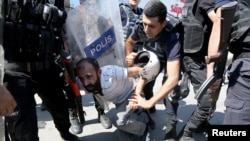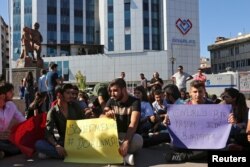Educators in Turkey are at the center of a crackdown, with more than 12,000 teachers suspended for alleged links to the Kurdish PKK rebel group.
"At a very early hour in the morning, police came banging on my door," one teacher said of the intimidating tactics employed. "They violently entered and told me that there is an order for my 'detention.' You go through a big worry and fear at that time, but you also know that you have not done anything wrong. Yet you know you still can get such a harsh treatment."
The teachers are accused of supporting terrorism because they participated in a strike last year calling for an end to fighting between the Turkish state and the PKK. However, Saliha Zorlu — co-head of the Diyarbakir branch of Egitim-Sen, the educators union — says there is a wider agenda behind the crackdown.
"We are very worried," Zorlu said. "Egitim-Sen is the guarantee of secularism both in the field of education and in society in general. If there is no active opposition by Egitim-Sen, I believe the education system will be pushed away from secularism and transformed into a religious system under the hegemony of religion.
"We are already seeing the signs of this today,” she added. "During the attack on us, we saw that imams were appointed to state-run dormitories."
Kurds in Turkey traditionally are religious conservatives. Religious groups in the region backing the government have recently stepped up their activities, advocating for the region's return to its Islamic roots as a counter to the pro-secular, Marxist-rooted PKK — the Kurdistan Workers' Party. As is the case in the rest of the country, there has been an expansion of religious schooling in the Kurdish region.
However, the government insists its suspension of teachers is only about fighting terrorism.
"In the upcoming days, those who made propaganda for the terror organization, who boycotted schools and who encouraged students to join the terrorists will be separated from the innocent teachers," said Muhammed Akar, the head of the ruling AKP party in Diyarbakir.
"I can say that a significant percentage will be reinstated to their duties, and the others, those who are guilty, will be charged," he added.
The arrests and suspensions of teachers are continuing to provoke anger and protests; many parents complain that their children are without teachers.
Idris Baluken, a parliamentary group leader of the pro-Kurdish HDP party, warns the suspensions are adding more tension to the region.
"The position of the Kurdish teachers is like cartilage between two bones," he said. "Yes, when you go to school, you can't have education in Kurdish, but still, Kurdish-speaking teachers can help with the problems faced by children who do not speak Turkish.
"By taking out this cartilage," Baluken said, "President [Recep Tayyip] Erdogan is causing friction, making two bones rub against each other."
The conflict-strewn region appears to have a new front line: education, with children and teachers destined to become caught in the crossfire.





